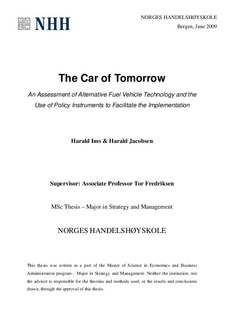| dc.description.abstract | This master’s thesis assesses different alternative fuels and fuel vehicles in a European
context in short and medium term. We apply a contextualised GREET model to determine
the energy usage, emissions and technological improvement of eight selected vehicles
running on four different fuels. In addition we use a payback analysis to determine the
payback period of each alternative. The results show that diesel vehicles outperform petrol
vehicles. Plug-in hybrids look promising, but their efficiency improvement from 2010 to
2020 is modest compared to some of the other technologies. The battery electric vehicle and
fuel cell vehicle are the cleaner and more efficient technologies in 2020, however the FCV
involves a high degree of uncertainty within our timeframe. We therefore select HEV, PHEV
and BEV as our preferred alternatives. Using a stakeholder approach, we identify barriers to
the implementation of our selected technologies. To overcome these barriers we apply a
selection of policy options. | nb_NO |
